Color-Temperature-Balancing Colored Glass Filters

- Increase the Color Temperature of a Visible Light Source
- Conversion Value: -132 or -160 mireds
FGT05165
Ø12.5 mm
-132 mireds
FGT200
Ø25.0 mm
-160 mireds
FGT200 Ø25.0 mm
Filter Shown Mounted
in the Filter Holder of
the SLS201L Stabilized
Broadband Light Source

Please Wait
| General Specifications | |
|---|---|
| Clear Aperture | 80% of Diameter (Circular Filters) |
| Surface Quality | 40-20 Scratch-Dig |
| Transmitted Wavefront Error | Ø12.5 mm: <λ/4 at 632.8 nm Ø25.0 mm: <λ/2 at 632.8 nm |
| Dimensional Tolerance | +0.0/-0.4 mm |
| Parallelism | <3 arcmin |
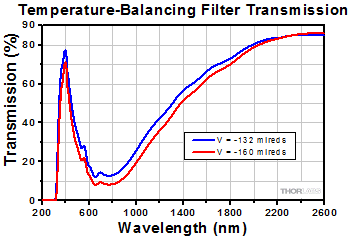
Click to Enlarge
Click to Download an Excel File of Raw Data
The graph above shows the measured transmission curve for a filter with a conversion value (V) of -132 mireds and a filter with a conversion value of -160 mireds. For details on the mireds unit, please see the Conversion Values tab.
Features
- Pass Blue Light and Attenuate Red Light
- Available in Ø12.5 mm and Ø25.0 mm Sizes
- Use with Our Broadband or Stabilized Broadband Light Sources
These Color-Temperature-Balancing Colored Glass Filters are designed to increase the color temperature of broadband light sources by attenuating light on the red end of the visible and near-IR spectrum and transmitting light on the blue end. The amount of increase depends on the original color temperature of the source and the conversion value (V) of the filter. Filters with a more negative conversion value will increase the color temperature by a greater amount. We offer filters with conversion values of -132 mireds and -160 mireds. Given their conversion values, these filters are particularly useful in imaging applications for color correcting a tungsten light source to more closely match natural light. For an explanation of conversion values and the mireds unit, please see the Conversion Values tab.
Unmounted filters are available in Ø12.5 mm and Ø25.0 mm sizes. For easy integration with our broadband stabilized light sources, the Ø25.0 mm size can be mounted in the filter holder included with each source, as shown in the photo at the top of the page.
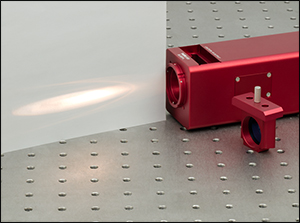
Click to Enlarge
The photo above shows light from an SLS201L 2796 K tungsten-halogen source with no filter installed. For a plot of the power output with and without a filter, please see the Conversion Values tab.
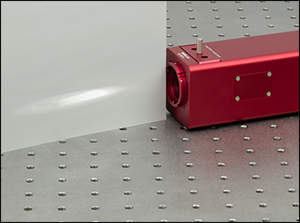
Click to Enlarge
The photo above shows light from an SLS201L 2796 K tungsten-halogen source with an FGT200 Ø25.0 mm filter installed. For a plot of the power output with and without a filter, please see the Conversion Values tab.
| Color Temperature of Light Sources After Filter | |||
|---|---|---|---|
| Light Source Item # (Unfiltered Temperature) | |||
| Conversion Value | SLS201L (2796 K) | OSL2 (3200 K) | |
| -132 mireds | 4432 K | 5540 K | |
| -160 mireds | 5059 K | 6557 K | |
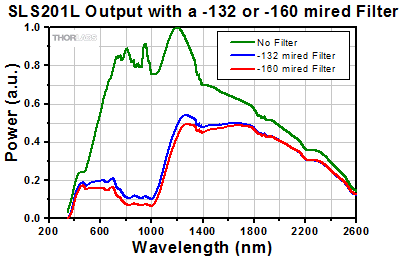
Click to Enlarge
Click to Download an Excel File of Raw Data
The graph above shows the measured spectrum of the SLS201L light source with and without a -132 mired filter or -160 mired filter installed.
The color temperature of a light source can be expressed in mireds (micro reciprocal degrees), given by 106 divided by the temperature in kelvin. For example, the color temperature of our SLS201L stabilized broadband light source is rated at 2796 K, which equates to 358 mireds. The SI unit of mireds is reciprocal megakelvin (MK-1).
The filters on this page offer a negative conversion value, meaning that they will decrease the mireds color temperature of light and thus increase the color temperature in kelvin. The filtered color temperature of a source can be calculated from the formula below, where V is the conversion value of the filter in mireds, K1 is the color temperature of the source in kelvin before the filter, and K2 is the color temperature in kelvin after the filter.

The table above and on the right gives calculated values for the color temperature of a selection of our white-light sources after being filtered. For example, the color temperature of the SLS201L light source when used with our -132 mireds conversion value filters can be calculated by first solving for K2, such that K2 = (106) / (V + 106/K1), and then by plugging in the initial color temperature (K1 = 2796 K) and the conversion value (V = -132 mireds) to produce K2 = 106 / 226 = 4432 K. The graph to the right shows the measured power output curve for the SLS201L source with and without the -132 or -162 mired filters.
| Posted Comments: | |
tomerg
(posted 2014-08-05 09:15:34.103) I have a Thorlabs hologen lamp OSL2 and I want to use the FGT200M color balancing filter with it (put in front of the source).
Is it Ok from themral point of view (i.e. deformation, breaking, etc.)?
Thanks, Tomer. jlow
(posted 2014-08-08 08:35:53.0) Response from Jeremy at Thorlabs: We have not tested this with the OSL2 but this should be fine if you mount it in a metal holder and use the full aperture of the optic. |

- Fabricated from 2.0 mm Thick LB-165 Hoya Glass
- Conversion Value of -132 mireds
- Ø12.5 mm Unmounted Filter
These unmounted, temperature-balancing, colored glass filters each offer a conversion value of -132 mireds.a By attenuating more red than blue light, they increase the color temperature of a given light source by an amount determined by the equation on the Conversion Values tab. For compatibility with our lens tubes and filter mounts, we offer this filter in a Ø12.5 mm size.
a. The conversion value is dependent on the thickness of the filter.

- Fabricated from 2.0 mm Thick LB-200 Hoya Glass
- Conversion Value of -160 mireds
- Ø12.5 mm and Ø25.0 mm Sizes
These unmounted, temperature-balancing, colored glass filters each offer a conversion value of -160 mireds.a By attenuating more red than blue light, they increase the color temperature of a given light source by an amount determined by the equation on the Conversion Values tab. For compatibility with our lens tubes and filter mounts, we offer these filters in Ø12.5 mm and Ø25.0 mm sizes.
a. The conversion value is dependent on the thickness of the filter.
 Products Home
Products Home













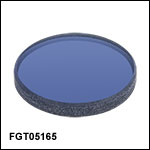
 Zoom
Zoom
 Color-Balancing Filters
Color-Balancing Filters